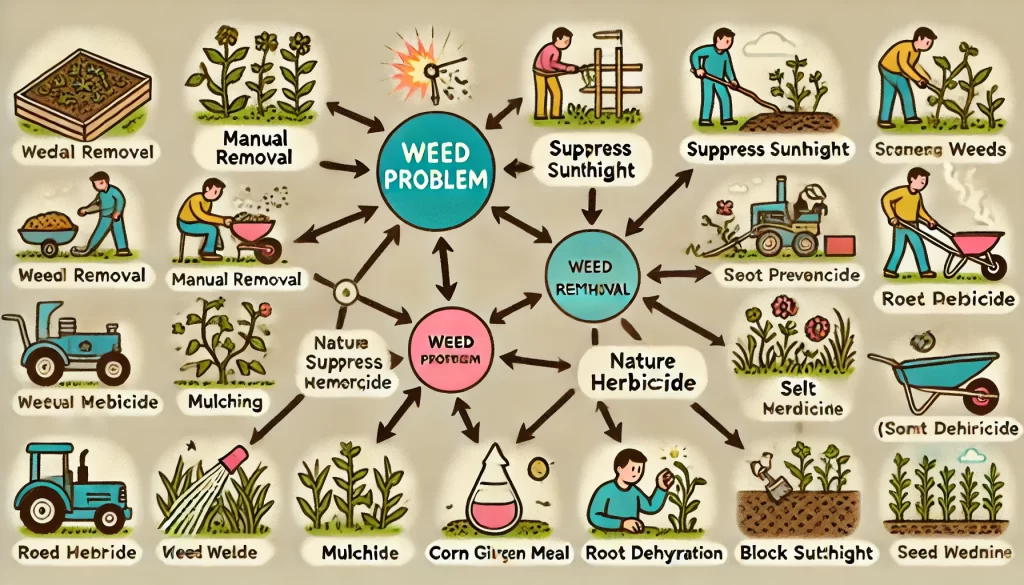Natural Ways to Get Rid of Weeds: A Comprehensive Guide
Natural weed removal needs can be a persistent problem in maintaining a lush, healthy lawn or garden. Their presence not only detracts from the aesthetic appeal of your outdoor space but also competes with desired plants for nutrients, water, and sunlight. Fortunately, there are natural weed removal and eco-friendly ways to eliminate weeds effectively. Here, we outline proven methods to get rid of weeds without resorting to harmful chemicals.
Understanding the Importance of Weed Control
Weeds are invasive plants that thrive in conditions where other plants struggle. They grow rapidly, reproduce quickly, and often outcompete desirable plants. Effective weed control is essential for:
- Preserving soil health.
- Maintaining the aesthetic value of your lawn or garden.
- Encouraging healthy plant growth.

Top Natural Weeds Removal Methods to Eliminate
1. Manual Weed Removal
Manually pulling weeds is one of the most effective natural methods for weed control. Here are some tips:
- Use the Right Tools: A hand weeder, hoe, or trowel can make the process easier and more efficient.
- Weed After Rain: Moist soil allows for easier removal, ensuring the entire root system is extracted.
- Pull Early and Often: Addressing weeds before they flower or seed prevents future infestations.
2. Mulching to Suppress Weeds
Mulching involves covering the soil with organic or inorganic materials to block sunlight and inhibit weed growth.
- Organic Mulch: Use wood chips, straw, grass clippings, or shredded leaves.
- Inorganic Mulch: Gravel or landscape fabric can also be effective.
- Depth Matters: Apply mulch at least 2-3 inches thick for maximum weed suppression.
3. Boiling Water
Boiling water is an easy and highly effective method for killing weeds:
- Target Specific Weeds: Pour directly onto the base of weeds.
- Repeat Applications: Some stubborn weeds may require multiple treatments.
- Caution: Avoid nearby plants, as boiling water can damage them as well.
4. Vinegar Weed Killer
Household vinegar is a natural herbicide that works well on young weeds.
- Application: Use a spray bottle to target weeds on a sunny day.
- Concentration: Choose a vinegar with at least 5-10% acetic acid for better results.
- Precautions: Protect nearby plants and avoid overuse, as vinegar can lower soil pH.
5. Corn Gluten Meal
Corn gluten meal prevents weed seeds from germinating while acting as a natural fertilizer.
- Timing: Apply before weed seeds germinate, typically in early spring.
- Application: Spread evenly over the soil and water lightly.
- Benefits: It provides nitrogen and improves soil fertility.
6. Salt Solutions
Salt dehydrates and kills weeds effectively when used sparingly.
- Mixing Ratio: Combine one part salt with two parts water.
- Application: Pour directly onto the weed base.
- Precautions: Avoid excessive use, as salt can make soil inhospitable to other plants.
7. Smothering Weeds
Blocking sunlight from weeds effectively kills them.
- Materials: Use cardboard, newspaper, or black plastic.
- Method: Cover the weedy area completely, securing the edges to prevent light penetration.
- Time Frame: Leave the cover in place for several weeks to ensure weed death.
8. Flame Weeding
Flame weeding involves using heat to destroy weeds.
- Tools Required: A flame weeder tool.
- Application: Sweep the flame briefly over weeds until they wilt.
- Safety: Avoid using materials that are near flammable or during dry conditions.
Preventive Measures for Long-Term Weed Control
1. Healthy Lawn Practices
A dense, healthy lawn can naturally suppress weed growth (natural weed removal).
- Mow Regularly: Keep grass at an optimal height (usually 3-4 inches).
- Fertilize Appropriately: Use organic fertilizers to promote vigorous grass growth.
- Water Deeply: Deep, infrequent watering encourages robust root systems.
2. Crop Rotation in Gardens
Rotating crops disrupts the life cycle of weeds.
- Diverse Planting: Avoid planting the same crops in the same spot each year.
- Companion Planting: Use plants that repel weeds naturally.
3. Proper Spacing
Overcrowded plants struggle, leaving room for weeds to thrive.
- Planting Density: Follow recommended spacing guidelines for each plant.
- Ground Covers: Use low-growing plants to fill in gaps and suppress weeds.
Conclusion
Natural weed control methods are effective, environmentally friendly, and easy to implement. By combining several of the techniques outlined above, you can maintain a healthy, weed-free lawn or garden while preserving the environment. Consistent effort and preventive practices will ensure long-term success in managing weeds naturally.
Last Updated on 4 weeks ago by Anjali Mehra Ph.D. in Horticulture (Punjab Agricultural University)
- Best Lawn Grass for Cold Climate in Kashmir - March 1, 2026
- Lawn Grass Lifespan in India – Which Grass Lasts Longest? - February 23, 2026
- Can Lawn Grass Grow Without Direct Sunlight? (2026 Expert Guide) - February 12, 2026
